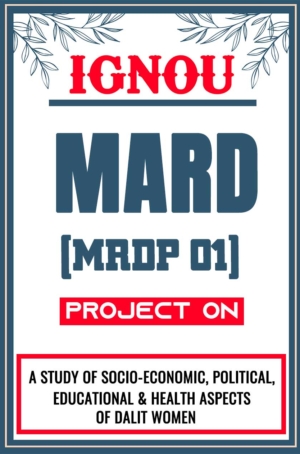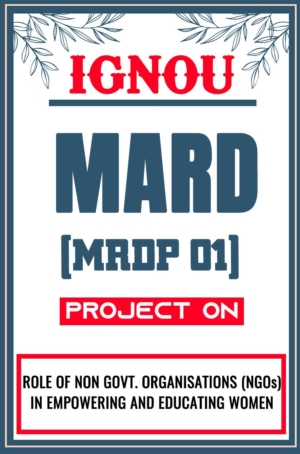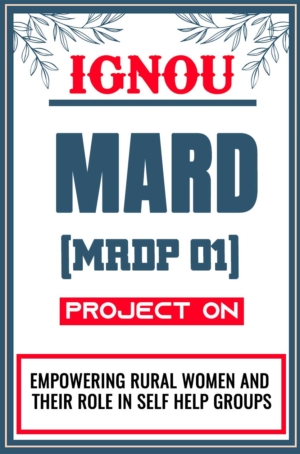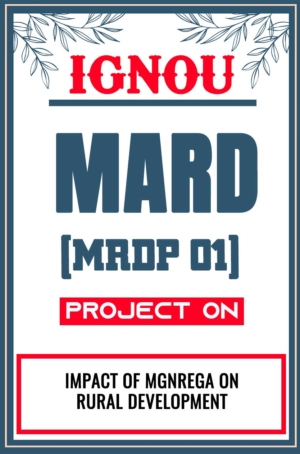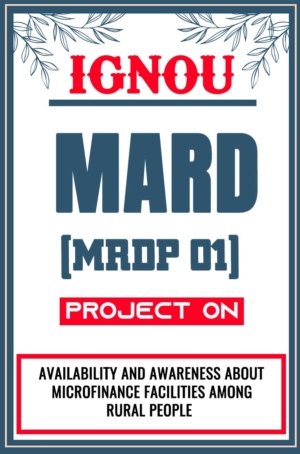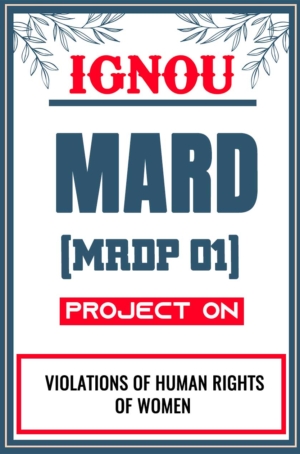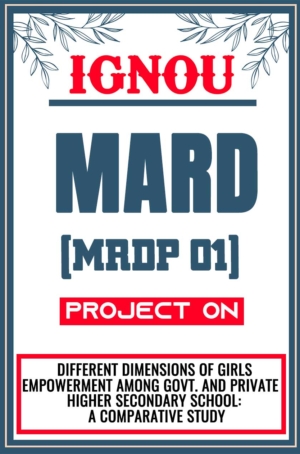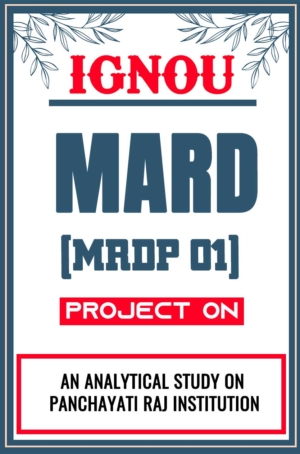Buy IGNOU MARD (MRDP-001) Project – Topic Ideas, Proposal/Synopsis, Data Collection & Analysis Tips, Formatting as per Guidelines
The IGNOU MARD Project is a process of improving the Quality life of people living in rural areas and they don’t have any facilities also this IGNOU Rural Development Project focuses on the development of the backward people too. The IGNOU MARD Project will be useful to personnel working in various Gov. Organization. It will also be beneficial for fresh graduates who are interested in pursuing a career in the discipline of rural development. The Course M.A. Program in Rural Development is intended to include such different academic contents as are essential in the making of this discipline in the Indian Context.
Whatsapp us to get the Personalized (Customized) IGNOU MARD Project Report and Synopsis
Download Link for IGNOU MARD Project (MRDP 1 PDF)
When should you start working on your IGNOU MARD Project?
You should start working on your MRDP 1 project as early as possible, ideally at the beginning of your academic term or as soon as you receive the project guidelines. Starting early allows you ample time to:
Select and refine your topic:
- Choose a relevant and feasible topic.
- Get approval from your supervisor.
Prepare and submit your proposal:
- Draft a detailed project proposal.
- Allow time for feedback and revisions.
Plan and conduct fieldwork:
- Schedule visits and data collection.
- Handle any unforeseen challenges.
Analyze data and write the report:
- Thoroughly analyze the collected data.
- Write, review, and revise your report.
Meet submission deadlines:
- Ensure timely submission to avoid any penalties.
IGNOU MARD Project Topics for MRDP 1
- A Study Of Socio-Economic, Political, Educational And Health Aspects Of Dalit Women
- Role Of Non-Government Organizations (Ngos) In Educating And Empowering Women”
- By Scp Panel Of Expert
- Empowering Rural Women And Their Role In Self Help Groups
- Impact Of Mgnrega On Rural Development
- Availability And Awarness About Micro Finance Facilities Among Rural People
Can you get assistance if you face difficulties during your IGNOU MARD Project?
Yes, you can get assistance if you face difficulties during your MRDP 1 project. Here are the main sources of support available to you:
Supervisor Guidance:
- Your assigned supervisor is your primary source of assistance. They can help you with topic selection, proposal preparation, research methodology, data analysis, and report writing. Regularly communicate with them to seek advice and feedback.
IGNOU Regional Center:
- Your regional center can provide additional support and resources. They can help clarify guidelines, deadlines, and procedural queries.
Academic Counselors:
- Academic counselors at study centers can provide guidance on academic and project-related issues. They can offer insights and suggestions to improve your research.
Peer Support:
- Collaborate with your classmates and peers. Sharing experiences and discussing challenges can lead to valuable insights and solutions.
Online Resources:
- Utilize online academic resources such as research articles, tutorials, and forums. Websites like Google Scholar, Research Gate, and academic databases can provide valuable information and support.
Workshops and Seminars:
- Participate in workshops, seminars, and webinars organized by IGNOU or other academic institutions. These events often provide practical advice and best practices for conducting research.
IGNOU Study Material:
- Refer to the study material provided by IGNOU, including the project manual and relevant course books. These materials contain guidelines and examples that can help you navigate your project.
What are some common pitfalls to avoid in the MRDP 1 project?
When working on the MRDP 1 project for the IGNOU MARD program, there are several common pitfalls you should be aware of and avoid:
1. Starting Late:
- Procrastination can lead to rushed work, which often results in poor-quality research and writing. Start your project early to allow adequate time for each stage.
2. Poor Topic Selection:
- Choosing a topic that is too broad, too narrow, or not feasible can hinder your research. Select a topic that is relevant, manageable, and approved by your supervisor.
3. Inadequate Proposal Preparation:
- Submitting a vague or poorly thought-out proposal can delay your project. Ensure your proposal is detailed, with clear objectives, methodology, and a timeline.
4. Insufficient Literature Review:
- A weak literature review can affect the foundation of your research. Conduct a thorough review to understand existing research, identify gaps, and justify your study.
5. Ineffective Data Collection Methods:
- Using inappropriate or poorly designed data collection methods can lead to unreliable data. Choose methods that suit your research objectives and ensure they are well-executed.
6. Neglecting Fieldwork:
- Skipping or inadequately conducting fieldwork can compromise the validity of your research. Plan and conduct your fieldwork diligently, ensuring thorough data collection.
7. Lack of Data Analysis:
- Simply collecting data without proper analysis is insufficient. Use appropriate tools and techniques to analyze your data and derive meaningful insights.
8. Ignoring Ethical Considerations:
- Failing to adhere to ethical guidelines, such as obtaining informed consent or maintaining confidentiality, can lead to serious issues. Follow all ethical protocols rigorously.
9. Plagiarism:
- Copying work without proper citation is a serious offense. Ensure all sources are properly cited and submit original work.
10. Poor Report Writing:
- A disorganized or poorly written report can undermine your research. Follow the prescribed format, use clear language, and ensure your report is well-structured and free of errors.
11. Ignoring Supervisor Feedback:
- Neglecting feedback from your supervisor can lead to repeated mistakes. Regularly consult your supervisor and incorporate their suggestions.
12. Inadequate Time Management:
- Poor time management can lead to missed deadlines and rushed work. Create a detailed timeline and stick to it.
13. Overlooking Formatting Guidelines:
- Not adhering to IGNOU’s formatting guidelines can result in a rejected report. Follow all formatting instructions carefully.
14. Failure to Proofread:
- Submitting a report with typos, grammatical errors, or inconsistencies can affect your evaluation. Thoroughly proofread your report before submission.
15. Inaccurate or Incomplete Data:
- Ensuring your data is accurate and complete is crucial. Double-check your data collection and entry for accuracy.
How do you handle discrepancies or unexpected findings in your IGNOU MARD Project research?
Handling discrepancies or unexpected findings in your research is a crucial part of the research process. Here’s how you can effectively manage them in your MRDP 1 project:
Acknowledge the Discrepancies:
Clearly identify and acknowledge any discrepancies or unexpected findings in your research. Document them meticulously.
Analyze the Causes:
Investigate the possible reasons behind these discrepancies. Consider factors such as data collection methods, sample size, respondent bias, or external variables that might have influenced the results.
Review Your Methodology:
Re-examine your research design and methodology to ensure there were no flaws or errors that could have led to unexpected findings. Check if the tools and techniques used were appropriate for your study.
Consult with Your Supervisor:
Discuss these findings with your supervisor. They can provide valuable insights and suggest ways to address the discrepancies or interpret the unexpected results.
Compare with Existing Literature:
Compare your findings with existing literature to see if similar discrepancies have been reported by other researchers. This can help you understand if your findings are part of a broader trend.
Adjust Your Analysis:
If appropriate, adjust your data analysis techniques to better understand the discrepancies. This might involve using different statistical methods or conducting a deeper qualitative analysis.
Interpret the Findings:
Provide a logical and well-reasoned interpretation of the discrepancies or unexpected findings. Discuss their implications and how they contribute to the existing body of knowledge in rural development.
Report Transparently:
Include a section in your report where you discuss these discrepancies in detail. Explain how they were identified, their potential causes, and their impact on your research.
Suggest Further Research:
Use these unexpected findings as a basis to suggest areas for further research. Indicate how future studies could address these discrepancies and provide more conclusive evidence.
Remain Objective:
Maintain an objective and unbiased approach while dealing with discrepancies. Avoid trying to manipulate the data to fit your initial hypotheses or expectations.
How do you ensure the ethical conduct of your IGNOU MARD Project research?
Ethical conduct is paramount in research. It safeguards participants, maintains research integrity, and builds trust in the scientific community. Here are key principles to follow:
Core Ethical Principles
- Respect for Persons: Treat participants as autonomous individuals with the right to decide their involvement.
- Beneficence: Maximize benefits and minimize harm to participants.
- Justice: Distribute benefits and burdens fairly.
Practical Steps
Informed Consent:
- Clearly explain the research purpose, procedures, risks, benefits, and participant rights.
- Obtain written consent from participants (unless waived by an ethics board).
- Ensure participants understand the information provided.
Privacy and Confidentiality:
- Protect participant data and maintain anonymity.
- Develop data management plans to secure information.
- Obtain necessary permissions for data collection and use.
Data Integrity and Accuracy:
- Collect and record data accurately and honestly.
- Avoid fabrication, falsification, or plagiarism.
- Maintain detailed research records.
Conflict of Interest:
- Disclose any potential conflicts of interest that might influence research outcomes.
- Implement measures to mitigate conflicts.
Ethical Review:
- Submit your research proposal to an ethics committee or Institutional Review Board (IRB) for approval.
- Follow their guidelines and recommendations.
Respect for Cultural Sensitivity:
- Be aware of cultural differences and avoid causing harm or offense.
- Adapt research methods to suit cultural contexts.
Animal Welfare:
- If using animals, adhere to strict guidelines for their care and use.
- Minimize pain and distress.
Important Question Ask by MARD Students
Q1. What is the last date to submit the Synopsis and project report?
Ans.
- Synopsis Last date For July batch is March 30th
- Report Last date For July batch is May 30th
- Synopsis Last date For Dec/ Jan batch is September 30th
- Report Last date For Dec/ Jan is November 30th
Q2. How do I select a suitable topic for my MARD project?
Ans. Choose a topic that interests you and is relevant to rural development. Ensure the topic is researchable and feasible within your resources and time frame. Discuss potential topics with your supervisor for approval.
Q3. How is the project evaluated?
Ans. The project is evaluated based on the quality of research, data analysis, report writing, and adherence to guidelines. There may also be a viva-voce.
Q4. What types of data collection methods can I use for my project?
Ans. Common methods include surveys, interviews, focus group discussions, and observations. Choose methods that best suit your research objectives and topic.
Ready to get your IGNOU MARD Project Report and Synopsis Sample PDF for MRDP 1?
- Call us or WhatsApp us at: 9958947060, 9354637830
- Visit: SHRICHAKRADHAR.COM
-
Sale!

-
Sale!

IGNOU MARD Project (MRDP 1) Synopsis/Proposal & Project Report/Dissertation in Hard-Copy (Sample-8)
Original price was: ₹499.00.₹249.00Current price is: ₹249.00. -
Sale!

IGNOU MARD Project (MRDP 1) Synopsis/Proposal & Project Report/Dissertation in Hard-Copy (Sample-7)
Original price was: ₹499.00.₹249.00Current price is: ₹249.00. -
Sale!

IGNOU MARD Project (MRDP 1) Synopsis/Proposal & Project Report/Dissertation in Hard-Copy (Sample-6)
Original price was: ₹499.00.₹249.00Current price is: ₹249.00. -
Sale!

IGNOU MARD Project (MRDP 1) Synopsis/Proposal & Project Report/Dissertation in Hard-Copy (Sample-5)
Original price was: ₹499.00.₹249.00Current price is: ₹249.00. -
Sale!

IGNOU MARD Project (MRDP 1) Synopsis/Proposal & Project Report/Dissertation in Hard-Copy (Sample-4)
Original price was: ₹499.00.₹249.00Current price is: ₹249.00. -
Sale!

IGNOU MARD Project (MRDP 1) Synopsis/Proposal & Project Report/Dissertation in Hard-Copy (Sample-3)
Original price was: ₹499.00.₹249.00Current price is: ₹249.00. -
Sale!

IGNOU MARD Project (MRDP 1) Synopsis/Proposal & Project Report/Dissertation in Hard-Copy (Sample-2)
Original price was: ₹499.00.₹249.00Current price is: ₹249.00. -
Sale!

IGNOU MARD Project (MRDP 1) Synopsis/Proposal & Project Report/Dissertation in Hard-Copy (Sample-1)
Original price was: ₹499.00.₹249.00Current price is: ₹249.00.

